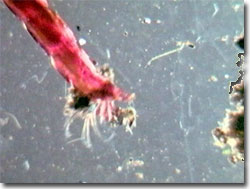Pond Life Digital Movie Gallery
Tubifex (Annelida) Movies
Commonly known as sewage worms, Tubifex tubifex is a true earthworm (class Oligochaeta), easily recognized by its red color and mud tubes. As freshwater annelids in the family Tubificidae, bloodworms are among the few invertebrates that can thrive in sewage settling ponds, armed with an efficient manner of assimilating dissolved oxygen. They are available commercially, alive, frozen, or freeze-dried as a high protein aquarium food.

Tubifex Video #1 - This red Tubifex appears to be determined to violently move everything in the viewfield; under oblique illumination with a playing time of 46 seconds. Choose a playback format that matches your connection speed:
Ranging in length from 1 to 8.5 centimeters, tubificids are often observed with their head segments embedded in mud tubes while the posterior segments wave about, collecting the limited dissolved oxygen with the created currents. Occasionally, massive balls of T. tubifex are observed in the water columns of lagoons, ponds, streams, marshes, and canals. The red color of this aquatic earthworm, known also as the bloodworm, reflects its relatively large supply of hemoglobin, which stores available dissolved oxygen in a fashion analogous to the human blood system. Because their natural habitats are at least periodically devoid of sufficient oxygen, Tubifex tubifex can "afford" its bright red color without fear of predation.
Live tubifex worms in the pet trade are not as common as they once were because wild worms from sewage-contaminated waters may harbor human pathogens responsible for tetanus, hepatitis, and other bacterial and viral diseases. Frozen or freeze-dried blocks of tubifex are sold commercially as a preferred diet for aquarium fishes, invertebrates, and some aquatic turtles and salamanders. Some living bacteria-free cultures are marketed, while other enriched premium products feature additional vitamins, pigment precursors, and nutrients, which are bioincorporated during the rearing and feeding of the tubificids. Utilized as fish feeds, these products enhance the health, and appearance attributes such as color, of prized aquarium fishes.
Contributing Authors
Cynthia D. Kelly, Thomas J. Fellers and Michael W. Davidson - National High Magnetic Field Laboratory, 1800 East Paul Dirac Dr., The Florida State University, Tallahassee, Florida, 32310.
BACK TO THE DIGITAL IMAGE GALLERIES
BACK TO THE OLYMPUS MIC-D DIGITAL MICROSCOPE
Questions or comments? Send us an email.
© 1995-2025 by Michael W. Davidson and The Florida State University. All Rights Reserved. No images, graphics, software, scripts, or applets may be reproduced or used in any manner without permission from the copyright holders. Use of this website means you agree to all of the Legal Terms and Conditions set forth by the owners.
This website is maintained by our
Graphics & Web Programming Team
in collaboration with Optical Microscopy at the
National High Magnetic Field Laboratory.
Last Modification Friday, Nov 13, 2015 at 01:19 PM
Access Count Since September 17, 2002: 29721
Visit the website of our partner in introductory microscopy education:
|
|
